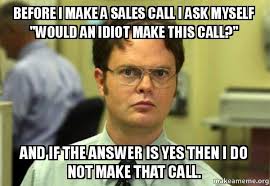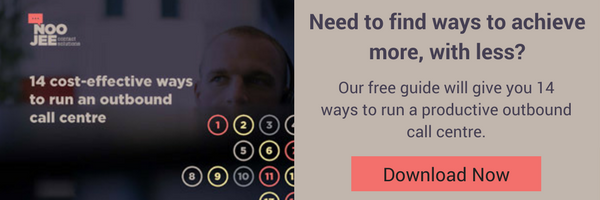Using call centre skills to get what you need

Using call centre skills to get what you need
Remember phone calls? They used to be the way people communicated most of the time. If you had a question to ask, you picked up the phone and called the person from whom you needed an answer. Crazy, right? Pre-texting, Facebook messaging, email, WhatsApp. All these communication options mean few people are having actual conversations. In fact, there is now such a thing as psychological lock jaw, where anything that takes place ‘live’ without editing, filters and total control over how one appears, can be debilitating.
Life cannot be lived in total isolation. In fact, relationships are crucial to a feeling of connectedness and happiness. In most jobs, building relationships is an essential part of a successful performance- for anyone from a receptionist to a BDM whose role is to close sales over the phone. Anyone wanting to develop conversational skills and achieve more in their phone calls can take tips from workspaces like call centres- applying call centre skills can help you have more effective conversations (after all, it’s what call centre agents do, all day every day). It just comes down to applying a little forethought to each conversation, and practicing the talking until it starts to come a bit more naturally. One day you’ll find it as easy to talk as you do to swipe.
Prepare Yourself
Any call centre manager will tell you, you should be very clear well before you pick up the phone, how you’d like the flow of the conversation to go and the key points you’d like to cover. You could be a little more regimented and incorporate call centre skills like following a script, but that can make the conversation a little stilted, and what you want is a natural energy to keep the conversation going. A little back-of-the-envelope scribble can be all that’s needed to give you something to refer to throughout the conversation if you feel like things aren’t flowing, and can help get things back on track.
Preparation includes knowing the best time of day to call. Understand the life the person on the other end of the phone is leading as best you can, and try to fit your call unobtrusively into it.
Get chatty
Small talk is like Advanced Talking. If you’re not comfortable with talking, then filling silences with small talk can seem excruciating. But building rapport is pretty important to bringing a positive energy to the phone conversation and ultimately gives you a better chance of getting the outcome you want. You don’t have to talk about the weather, in fact inane small talk can get someone’s back up pretty quickly as they will smell a sales pitch straight away.
What is the right way to build rapport? You could try a bit of empathy.
‘I bet <insert job title> is pretty time-consuming, I’m really sorry if I’m interrupting you. Are you flat out?’
‘I’m sorry for interrupting your day. I know with <insert relevant news about the category they work in> a lot of people I’m talking to have been crazy busy.’
Often people like to talk about how busy they are. Applying a little empathy can go a long way to getting people on side, and speaking about something topical to their industry shows them that you just might have something interesting and of value to offer them.
Get to the point
Any outbound salesperson will know that every second spent on the phone with a prospect is valuable- waste any and you could be cut off before you know it. This means not rambling on too long when establishing rapport. Establish a connection (or not, you can’t get blood out of a stone and you won’t connect with everyone), and move onto the purpose of the call. Don’t leave them wondering what you want, how much it will cost and how they can get off the phone. If they’re spending time wondering all these things, they’re not going to be listening to you.
Clarity is your friend.
It’s not about you
Don’t talk and talk and fill every available space with more words. If you’re nervous you might feel yourself rambling and needing to fill the silences, but this is a pretty quick way to get your prospect to cut you off (and not in order to say ‘Yes! I’ll take it!!’). Take a deep breath, slow down and listen as much as you speak- i.e. have a conversation. Always keep in the back of your mind that every moment this person is staying on the phone with you is a moment they could be doing anything else, even things that could make them money. Be grateful for that, and apply that gratitude to your conversation- don’t make it a monologue.
Know what you want from them
Is this a situation where you need one thing from them? You need them to buy product x, maybe make an appointment or it’s a wasted call? This rigid approach can stack the odds against you. Maybe it’s enough to have a conversation, build a little rapport and have them agree to a follow up call at a time that suits them. Perhaps they won’t mind receiving an email with more information, or agree to receiving a demo of your offer. Softly softly, build the relationship, know where they are on the sales funnel and know when to make the big ask.
Little things
There are a lot of little things that can work against you in a phone conversation. Adopting little tips from call centre managers can help you think broadly about the call, not just about the conversation itself.
- If you work from home, or on the road, you are at the mercy of your mobile phone coverage. Make sure you’re in an area with solid coverage so you won’t drop in and out.
- Ensure you won’t be interrupted. Don’t sit down at a café and dial your number. Saying ‘sorry I just need to place my coffee order’ won’t sit well with your prospect and ignoring the waitperson while you talk on the phone isn’t a good look for anyone.
- Listen out for changes in background noise, call waiting or other signs the prospect’s situation has changed. Be sensitive to this and offer to call back if they need to go.
You don’t have to be an outbound sales person for solid phone conversation skills to take you far in your career (or your personal life for that matter). Call centre skills are great to apply to any phone conversation, whether you want a sale, more information, a date, or just to have a nice flowing conversation. It takes practice, especially in the age of texting and WhatsApping, but with a little structure and patience, your conversation skills can get to the point where it may even be your preferred way of communicating! Ok let’s not get crazy, but actually speaking to people is an art that should not be lost as there is no better way to give and receive value.


